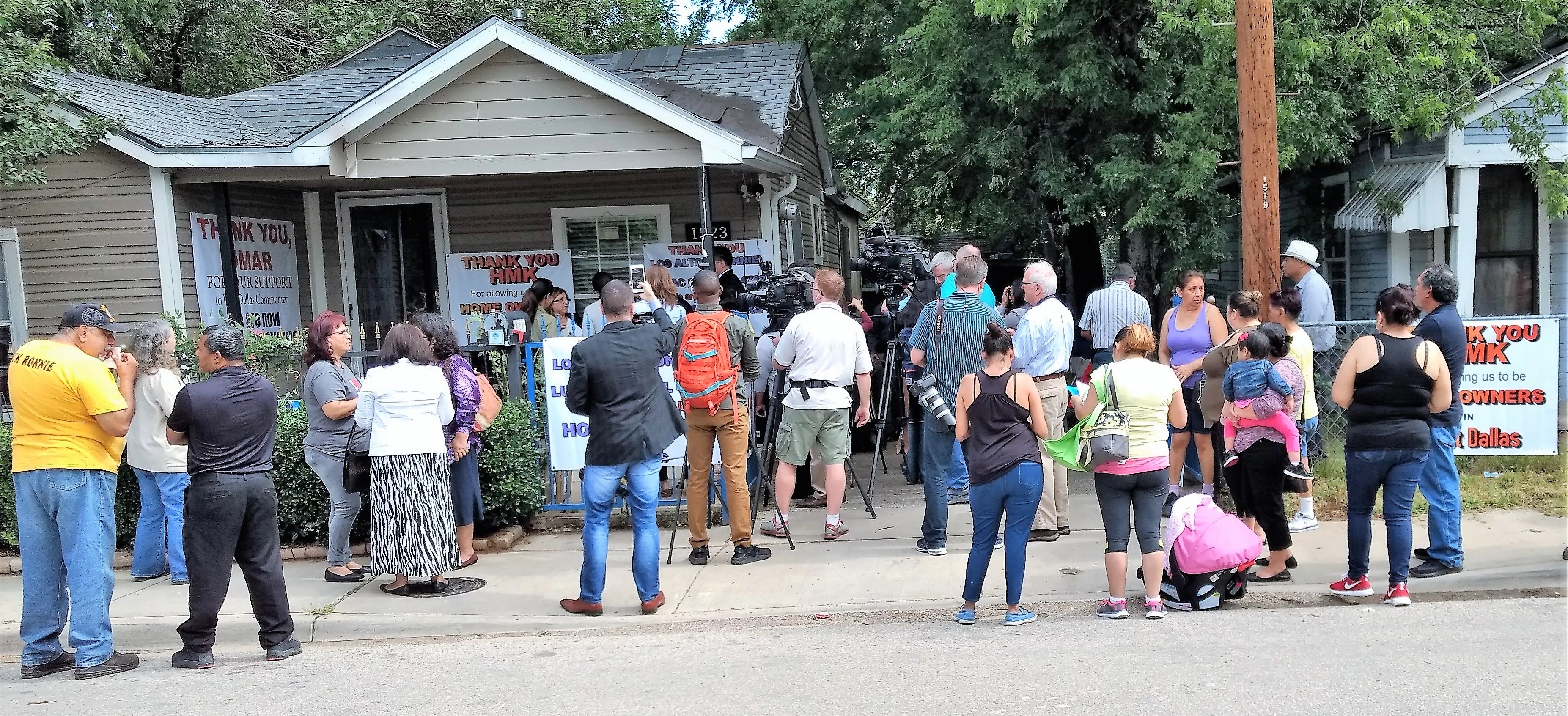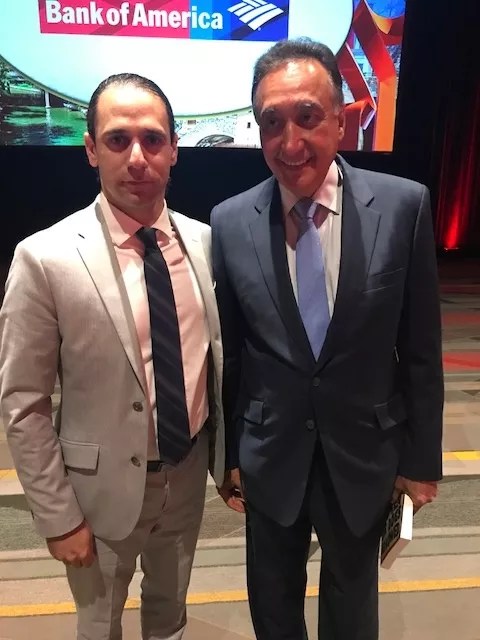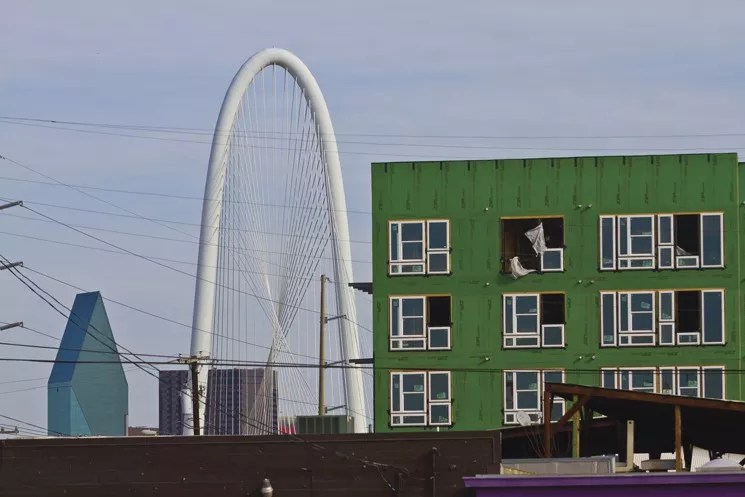
Jim Schutze

Audio By Carbonatix
If people who write about and think about affordable housing on a national level ever look at Dallas – and they do, from time to time – surely they will find the Dallas citizen who was just commended by the recent national convention of the League of United Latin American Citizens for his work in creating home ownership among the working poor.
You know who I mean, right? No, it’s not Mayor Mike Rawlings, in spite of the mayor’s much-vaunted but stillborn Grow South program to bring investment to the city’s bitterly impoverished southern hemisphere. Ah, not really, not after the mayor helped kill an anti-discrimination ordinance that would have allowed poor people to use housing vouchers in North Dallas.
Did you think it might be David Woodyard, president and CEO of Catholic Charities of Dallas? He’s been in the news a bit lately. The mayor gave him $300,000 in city money to help poor families caught up in the city’s rental crisis. But after Catholic Charities took $30,000 off the top of that money for administration, it’s been kind of a no-show in the effort to keep people in their homes. Probably still administering.
No, the Dallas citizen whom LULAC chose to give its only national award this year for affordable-housing advocacy was Khraish Khraish, often slurred as a slumlord by City Hall, the advocacy community and the opinion pages of the city’s only daily newspaper.
Yes. That’s what I said. Khraish, the so-called slumlord. He is the one person in Dallas – the only person in the nation, in fact – found worthy of commendation by the venerable Hispanic civil-rights organization at its national convention in San Antonio last weekend.
The resolution commending Khraish, which was voted on and approved first at local and state levels before going to the national convention, stated that Khraish “has contributed significantly to the successful pursuit of resolving perceived housing inadequacies in West Dallas … has constantly shown a sensitivity to effectively address and discuss the perception of housing inadequacies of the community of West Dallas… [and] reversed his position and opted to sell some of the homes in West Dallas to the tenants at reasonable prices, while lending money at reasonable rates.”
All of that may need a little back story if you have not been following the harrowing saga of Khraish; his father, Hanna Khraish; their attorney and development partner, John Carney; their company, HMK Ltd.; and the long, nasty legal battle they have fought with City Hall over gentrification. But first, because I don’t want it to slip away, let me point to one aspect of this award:

Khraish Khraish (left) visits with Henry Cisneros, former Housing and Urban Development secretary and San Antonio mayor, at the recent national LULAC convention in San Antonio.
John Carney
This is a private, for-profit landlord company. It has been smeared locally, sued by the city and denounced by mainstream media as a slumlord. Now one of the most respected civil-rights organizations in the country has recognized it as a leader in the fight for decent affordable housing. Somewhere in this apparent contradiction, there has got to be a nugget of truth worth plucking.
So much of what gets written nationally about poor people and housing is authored by people who seem to have no inkling how things really work on the streets of poverty. Kevin D. Williamson of National Review, an insightful writer on other topics, penned an uncharacteristically obtuse op-ed piece carried by The Dallas Morning News recently in which he blamed the lack of affordable housing on snobs and Democrats.
“Restrictive zoning and development rules in places such as New York City and San Francisco artificially restrict the supply of housing, often for purely aesthetic reasons,” Williamson wrote. “The only way to make housing more plentiful is to make housing more plentiful. What that implies, especially in the case of our big cities, is denser development. But our big-city governments – which are almost exclusively under Democratic control – will not allow that.”
That argument – that Democrats and fancy people are barring poor people from decent housing – may be picking up some distressing momentum. Only days after Williamson’s piece ran, David Brooks had a column in The New York Times echoing the sentiments, arguing that the most important factor inhibiting development of affordable housing is “residential zoning restrictions.”
“Well-educated people tend to live in places like Portland, New York and San Francisco that have housing and construction rules that keep the poor and less educated away from places with good schools and good job opportunities,” Brooks said. “These rules have a devastating effect on economic growth nationwide.”
It’s an analysis that makes about as much sense as blaming the housing crisis on vegans and the French because some of the nation’s nicest houses are occupied by vegans and French people. I spoke with Khraish yesterday about what he sees as the main obstacle to private sector development in the poor neighborhoods where he and his father own hundreds of small houses.
He said restrictive zoning isn’t even on the radar. The big problem with most of that land, he said, is that it’s impossible to get a clear title. An almost bottomless pit of snarled deeds and accrued liens and taxes makes straightening out the ownership far more costly than the land itself is worth.
Philanthropist J. McDonald Williams and his Foundation for Community Empowerment in Southern Dallas encountered exactly this problem decades ago. The same pitfall initially stymied efforts by St. Michael and All Angels Episcopal Church of Highland Park to revive the Jubilee Park neighborhood near Fair Park.
In fact, Khraish believes title problems are the real reason the mayor and city attorney have been hounding him so hard to put all of HMK’s West Dallas holdings on the market. In rapidly gentrifying West Dallas, properties owned by HMK and other landlord companies are unique because the land tends to be under clear titles. Therefore, it can be blocked up into large holdings.
There is no scalable solution to the affordable-housing crisis that does not involve scalable real estate development – the ability to block up land. But there also is no opportunity for upscale multifamily development that does not also involve assembling large blocks of land.
If someone could get her or his hands on the HMK holdings – and remember, the mayor has given Khraish names and phone numbers of people to whom he might sell – then that person would suddenly acquire several city blocks already assembled under one clear title. In a part of town where land values are doubling and tripling, that would be a pretty slick play.
So the idea that effete liberals are somehow curbing development in the poorest reaches of the city by insisting on restrictive zoning simply has no relation to what’s really going on. What’s really going on is not good. The mayor and his allies are using all of their heft to push poor renters out of West Dallas and push Khraish into selling. But I’m quite sure if we examined the mayor’s group, we would find lots of people of a distinctly non-Democratic persuasion. Effete, I don’t know.

Construction of new bridge across the Trinity River to West Dallas sparked a contagion of upscale development in the formerly poor and neglected region.
Mark Graham
Carlos Manuel, LULAC District III North Texas director, explained what LULAC sees in Khraish. By agreeing to sell his rental properties to current tenants, Khraish is giving poor working people footholds in home ownership and stakes in the part of town they have occupied for generations. “It’s almost like Khraish is giving them back their community,” he said.
Khraish is very aware of what he is doing. “I have made 100 families into homeowners in West Dallas and South Oak Cliff,” he said. “The number of houses sold per year in DFW roughly is 50,000 units. So 100 over 50,000 is roughly zero. That’s my first point.
“My second point is this: There are 6,800 federally insured depository institutions in the United States. Of 6,800 banks, 70 to 75 are Hispanic or black-owned banks. That’s point number two.
“Point number three is this: A recent university study of net worth in the United States found an average net worth for a white family of $111,000. The average net worth of an African-American family is $7,000. And the average net worth of a Latino family is $8,000.
“The main factor for this disparity is homeownership. So I am bringing these three points together right now. Affordable housing is not just about housing. It is the way that families create net worth for themselves.
“If there is no national policy to create affordable housing and no lenders to provide access to the affordable housing, then African-American and Latino households will not generate any substantial increases in net worth because homeownership is the driver to financial stability and any sort of accumulation of net worth.”
That’s the slumlord talking. I’m just saying. Maybe somebody should listen to him. LULAC did.